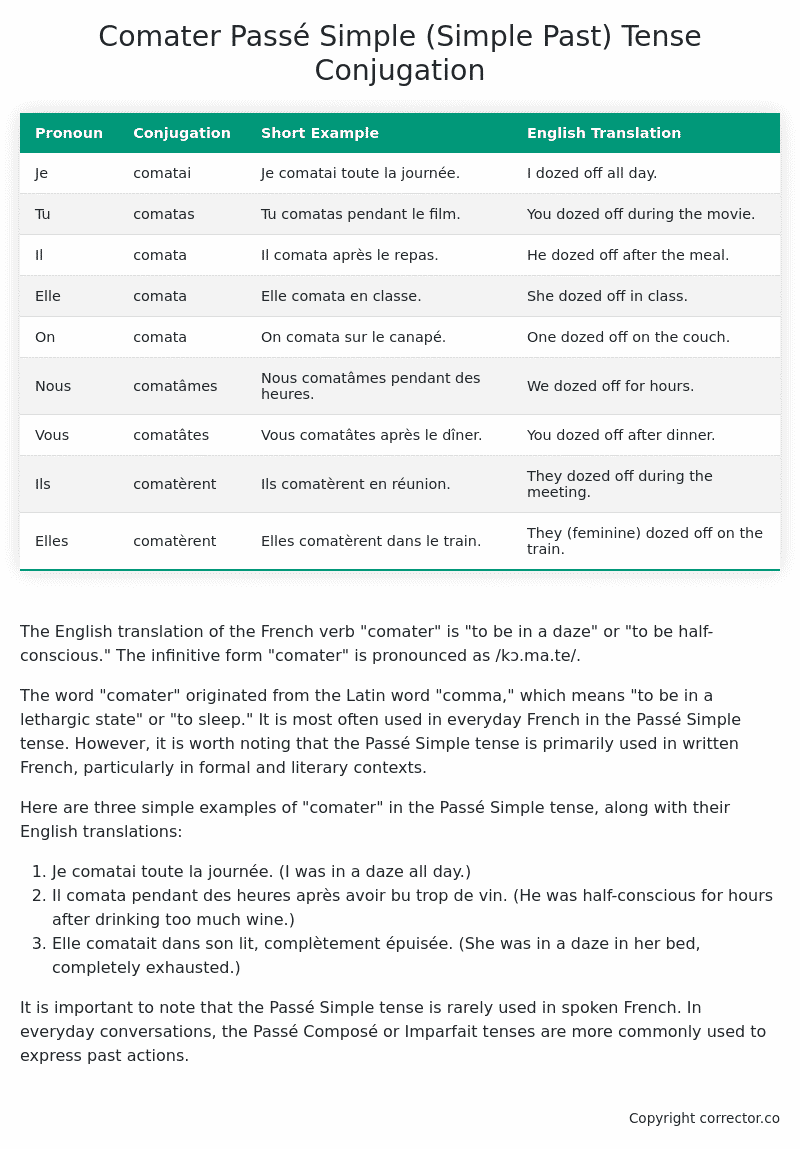Passé Simple (Simple Past) Tense Conjugation of the French Verb comater
Introduction to the verb comater
The English translation of the French verb “comater” is “to be in a daze” or “to be half-conscious.” The infinitive form “comater” is pronounced as /kɔ.ma.te/.
The word “comater” originated from the Latin word “comma,” which means “to be in a lethargic state” or “to sleep.” It is most often used in everyday French in the Passé Simple tense. However, it is worth noting that the Passé Simple tense is primarily used in written French, particularly in formal and literary contexts.
Here are three simple examples of “comater” in the Passé Simple tense, along with their English translations:
- Je comatai toute la journée.
(I was in a daze all day.) - Il comata pendant des heures après avoir bu trop de vin.
(He was half-conscious for hours after drinking too much wine.) - Elle comatait dans son lit, complètement épuisée.
(She was in a daze in her bed, completely exhausted.)
It is important to note that the Passé Simple tense is rarely used in spoken French. In everyday conversations, the Passé Composé or Imparfait tenses are more commonly used to express past actions.
Table of the Passé Simple (Simple Past) Tense Conjugation of comater
| Pronoun | Conjugation | Short Example | English Translation |
|---|---|---|---|
| Je | comatai | Je comatai toute la journée. | I dozed off all day. |
| Tu | comatas | Tu comatas pendant le film. | You dozed off during the movie. |
| Il | comata | Il comata après le repas. | He dozed off after the meal. |
| Elle | comata | Elle comata en classe. | She dozed off in class. |
| On | comata | On comata sur le canapé. | One dozed off on the couch. |
| Nous | comatâmes | Nous comatâmes pendant des heures. | We dozed off for hours. |
| Vous | comatâtes | Vous comatâtes après le dîner. | You dozed off after dinner. |
| Ils | comatèrent | Ils comatèrent en réunion. | They dozed off during the meeting. |
| Elles | comatèrent | Elles comatèrent dans le train. | They (feminine) dozed off on the train. |
Other Conjugations for Comater.
Le Present (Present Tense) Conjugation of the French Verb comater
Imparfait (Imperfect) Tense Conjugation of the French Verb comater
Passé Simple (Simple Past) Tense Conjugation of the French Verb comater (You’re reading it right now!)
Passé Composé (Present Perfect) Tense Conjugation of the French Verb comater
Futur Simple (Simple Future) Tense Conjugation of the French Verb comater
Futur Proche (Near Future) Tense Conjugation of the French Verb comater
Plus-que-parfait (Pluperfect) Tense Conjugation of the French Verb comater
Passé Antérieur (Past Anterior) Tense Conjugation of the French Verb comater
Futur Antérieur (Future Anterior) Tense Conjugation of the French Verb comater
Subjonctif Présent (Subjunctive Present) Tense Conjugation of the French Verb comater
Subjonctif Passé (Subjunctive Past) Tense Conjugation of the French Verb comater
Subjonctif Imparfait (Subjunctive Imperfect) Tense Conjugation of the French Verb comater
Subjonctif Plus-que-parfait (Subjunctive Pluperfect) Tense Conjugation of the French Verb comater
Conditionnel Présent (Conditional Present) Tense Conjugation of the French Verb comater
Conditionnel Passé (Conditional Past) Tense Conjugation of the French Verb comater
Conditionnel Passé II (Conditional Past II) Tense Conjugation of the French Verb comater
L’impératif Présent (Imperative Present) Tense Conjugation of the French Verb comater
L’impératif Passé (Imperative Past) Tense Conjugation of the French Verb comater
L’infinitif Présent (Infinitive Present) Tense Conjugation of the French Verb comater
L’infinitif Passé (Infinitive Past) Tense Conjugation of the French Verb comater
Le Participe Présent (Present Participle) Tense Conjugation of the French Verb comater
Le Participe Passé (Past Participle) Tense Conjugation of the French Verb comater
Struggling with French verbs or the language in general? Why not use our free French Grammar Checker – no registration required!
Get a FREE Download Study Sheet of this Conjugation 🔥
Simply right click the image below, click “save image” and get your free reference for the comater Passé Simple tense conjugation!

Comater – About the French Passé Simple (Simple Past) Tense
Formation
Usage
Narration
Historical Context
Interactions with other tenses
Passé Composé
Imparfait
Conditional and Subjunctive
Summary
I hope you enjoyed this article on the verb comater. Still in a learning mood? Check out another TOTALLY random French verb conjugation!


